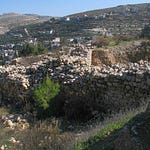Betzalel the architect of the Mishkan is described as having a specific set of intellectual qualities.
שמות לא
ב) רְאֵ֖ה קָרָ֣אתִי בְשֵׁ֑ם בְּצַלְאֵ֛ל בֶּן־אוּרִ֥י בֶן־ח֖וּר לְמַטֵּ֥ה יְהוּדָֽה: ג) וָאֲמַלֵּ֥א אֹת֖וֹ ר֣וּחַ אֱלֹהִ֑ים בְּחׇכְמָ֛ה וּבִתְבוּנָ֥ה וּבְדַ֖עַת וּבְכׇל־מְלָאכָֽה׃
Shemot 31
2) "See, I have called by name Bezalel the son of Uri, the son of Hur, of the tribe of Judah, 3) and I have imbued him with the spirit of God, with wisdom, with insight, with knowledge, and with [talent for] all manner of craftsmanship
These 3 intellectual qualities could be loosely translated as wisdom or science, perception or intuition, and knowledge or ideas. This tripartite division appears throughout Torah, discussed in Proverbs (3:19-20, 24:3-4) and in commentaries on Avot (3:17). Avraham ben HaRambam defines these qualities in his commentary on the above verse:
ר' אברהם בן הרמב"ם שמות לא:ג
רוח אלהים – רמז לכח השכלי.
בחכמה – מה שילמד האדם מזולתו ויזכור.
ובתבונה – מה שיחדש משכלו וימציא על ידי המחשבה והחזיון וההיקש.
ובדעת – השלימות השכלית היוצאת מן החכמה והתבונה; ולמפרשים כוונות רבות בזה ומה שהבנתי הוא מה שאמרתי.
ובכל מלאכה – כלומר אין שלימותו במלאכה (אחת) בלתי מלאכה (אחרת) אלא הוא מומחה במלאכות השונות נוסף על שלימותו בחכמה ובתבונה ובדעת; ומציאותה של שלימות זו כלומר (השלימות) במדע העיוני ובמעשים השימושיים בבת אחת באיש אחד נפלאת היא.
Spirit of God – implies all intellectual capacities
With wisdom – what one learns and remembers from others
With perception – what a person innovates with their mind and arrives at through thinking, vision, and interconnection.
With knowledge – the intellectual perfection that comes from wisdom and perception; and the commentators have many different approaches with this, but I understand it as I have outlined above.
And with all work – meaning there is no perfection in singular work without a broader expertise in different types of work beyond perfection in wisdom, perception, and knowledge. And finding this perfection, meaning theoretical and practical implementation in a single instance in one person is astounding. (My translation)
Avraham ben HaRambam explains there are 3 types of knowledge. Basic information or concepts that one learns from others. Expansion beyond this through thinking and making connections between subjects. And the knowledge and intellectual perfection achieved through this basic understanding and more advanced perception. This he described as a quality in the person themselves. He further elaborates that what was unique about Betzalel was the combination of theoretical understanding and the practical knowledge of implementation.
Interestingly, these intellectual qualities are personified in describing 3 different types of people in the Hagadah:
משנה תורה - ספר זמנים - הלכות חמץ ומצה - נוסח ההגדה
עֲבָדִים הָיִינוּ, לְפַרְעֹה בְּמִצְרַיִם; וַיּוֹצִיאֵנוּ ה' אֱלֹהֵינוּ מִשָּׁם, בְּיָד חֲזָקָה וּבִזְרוֹעַ נְטוּיָה. וְאִלּוּ לֹא גָאַל הַקָּדוֹשׁ בָּרוּךְ הוּא אֶת אֲבוֹתֵינוּ מִמִּצְרַיִם, עֲדַיִן אָנוּ וּבָנֵינוּ וּבְנֵי בָנֵינוּ מְשֻׁעְבָּדִים הָיִינוּ לְפַרְעֹה בְּמִצְרַיִם. וְאַפִלּוּ כֻּלָּנוּ חֲכָמִים, כֻּלָּנוּ נְבוֹנִים, כֻּלָּנוּ יוֹדְעִים אֶת הַתּוֹרָה--מִצְוָה עָלֵינוּ לְסַפֶּר בִּיצִיאַת מִצְרַיִם; וְכָל הַמַּאֲרִיךְ בִּיצִיאַת מִצְרַיִם, הֲרֵי זֶה מְשֻׁבָּח.
Rambam - Laws of the Chametz and Matzah - Text of the Hagadah
We were all slaves to Pharaoh in Egypt; and Hashem our God brought us out from there, with a strong hand and outstretched arm. And if the Holy One Blessed be He did had not redeemed our forefathers from Egypt, we and our children and children’s children would still be enslaved to Pharaoh in Egypt. And even if were are all wise, we were all perceptive, and we all knew the Torah, we are commanded to discuss the exodus from Egypt. And all those who elaborate in (discussing) the exodus from Egypt, behold this is praiseworthy. (My translation)
The Hagadah explicitly mentions that all these 3 archetypes of thinkers, possessors of different types of wisdom, perception, and knowledge, are obligated to discuss the exodus. The Rav explains how each of the 3 archetypes engage in the discussion:
Rabbi Joseph B. Soloveitchik - An Exalted Evening
The Haggadah introduces here three types of scholars: the hakham, the scholar who is a creative genius; the navon, the scholar who can formulate, explain, and systematize; and the yode’a, the scholar who can apply. All of them are supposed to engage in the study of Yetziat Mitzrayim. The hakham can behold things that are invisible to others. The navon can develop and systematize a whole philosophy of Jewish fate and destiny. And the yode’a et ha-Torah can apply it to present problems, to the events of the day. We study the Jewish people, its past, present, and future, its aspiratons and destiny, under all three aspects - and every scholar can contribute a share. Yetziat Mitzrayim is not just a story about an event that lies in a dark past. It is the doctrine of the Jewish people; it is the philosophy of our history. It is the Jewish people’s outlook on the world; and to that, the Haggadah says, the entire process of intellectual understanding can be applied. (p.35)
The Torah recognizes and values different types of thinking. Whether theoretical, categorical, or practical, each way of understanding the world makes a contribution. While it is rare to have these various qualities combined in the same person, it is optimal when different thinkers and intellects can work in concert toward a singular objective or endeavor.
References
Rosenberg, A. (1980). A new English translation of the Hebrew Bible text and Rashi, with a commentary digest. New York: Judaica Press. Retrieved from: https://www.chabad.org/library/bible_cdo/
Soloveitchik, J. D. & Genack, M. (2009). The seder night: An exalted evening : the Passover Haggadah : with a commentary based on the teachings of Rabbi Joseph B. Soloveitchik. New York, N.Y: OU Press.













Share this post